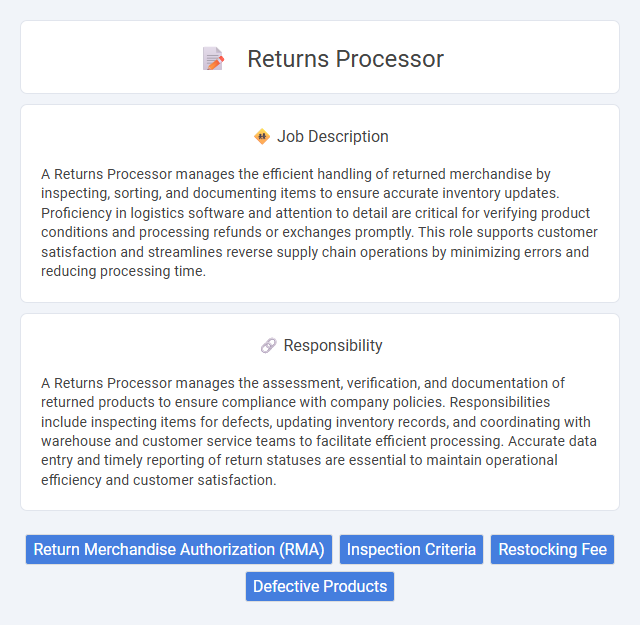
A Returns Processor manages the efficient handling of returned merchandise by inspecting, sorting, and documenting items to ensure accurate inventory updates. Proficiency in logistics software and attention to detail are critical for verifying product conditions and processing refunds or exchanges promptly. This role supports customer satisfaction and streamlines reverse supply chain operations by minimizing errors and reducing processing time.
People with strong attention to detail and good organizational skills are likely to be suitable for a returns processor job, as it often involves inspecting returned items and verifying their condition accurately. Individuals who can handle repetitive tasks and maintain focus under moderate pressure may have a higher probability of success in this role. Conversely, those prone to distraction or discomfort with repetitive work might find it less fitting.
Qualification
A Returns Processor must possess strong organizational skills and attention to detail to accurately inspect and categorize returned merchandise. Proficiency in inventory management software and basic data entry is essential to ensure efficient processing and documentation of returns. Previous experience in warehouse operations or customer service enhances the candidate's ability to handle return logistics and resolve discrepancies effectively.
Responsibility
A Returns Processor manages the assessment, verification, and documentation of returned products to ensure compliance with company policies. Responsibilities include inspecting items for defects, updating inventory records, and coordinating with warehouse and customer service teams to facilitate efficient processing. Accurate data entry and timely reporting of return statuses are essential to maintain operational efficiency and customer satisfaction.
Benefit
Returns processor jobs likely offer the benefit of enhancing organizational efficiency by managing returned products systematically. They probably contribute to reducing losses and improving customer satisfaction through accurate inspection and processing. This role might also provide valuable experience in logistics and inventory management.
Challenge
Returns processor jobs likely involve managing high volumes of returned products, which can present challenges in maintaining accuracy and efficiency. Handling diverse product categories while ensuring proper inspection and restocking might require strong attention to detail and organizational skills. The role probably demands adaptability to fluctuating return rates and efficient problem-solving under time constraints.
Career Advancement
Returns processors play a crucial role in managing product returns and assessing items for restocking or disposal, which builds a strong foundation in supply chain and inventory management. Mastery of data entry, quality control, and logistics coordination enhances opportunities for promotion to roles such as inventory analyst or warehouse supervisor. Developing expertise in return policies and customer service further supports career advancement within e-commerce and retail operations.
Key Terms
Return Merchandise Authorization (RMA)
A Returns Processor manages the Return Merchandise Authorization (RMA) process by verifying product eligibility and ensuring accurate documentation for returns. They coordinate with inventory and quality control to assess returned items, facilitating efficient refund or replacement procedures. Expertise in RMA software and adherence to company return policies are essential for minimizing errors and enhancing customer satisfaction.
Inspection Criteria
A returns processor evaluates returned products based on detailed inspection criteria including product condition, packaging integrity, and functional performance. They check for defects such as scratches, missing components, and signs of wear to classify items for restocking, repair, or disposal. Accurate inspection ensures efficient inventory management and minimizes loss through proper categorization and documentation.
Restocking Fee
Returns processors manage customer product returns by inspecting items for defects, verifying purchase details, and updating inventory records. A critical aspect of this role includes calculating and applying restocking fees, which typically range from 10% to 20% of the original purchase price to cover handling and resale preparation costs. Effective management of restocking fees helps optimize return policies, minimize revenue loss, and maintain accurate financial reporting.
Defective Products
Returns processors specializing in defective products meticulously inspect and document items to identify faults such as manufacturing defects, damages, or malfunctions. They ensure proper sorting and disposition, including initiating repair processes, restocking, or coordinating with suppliers for replacements. Efficient handling of defective returns minimizes inventory losses and enhances customer satisfaction by facilitating timely resolutions.
 kuljobs.com
kuljobs.com